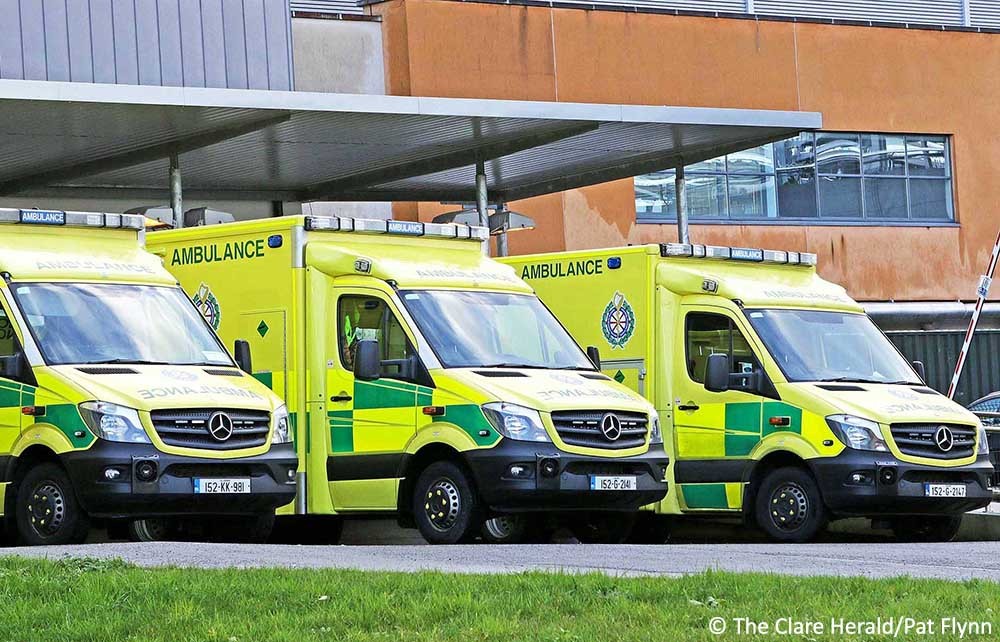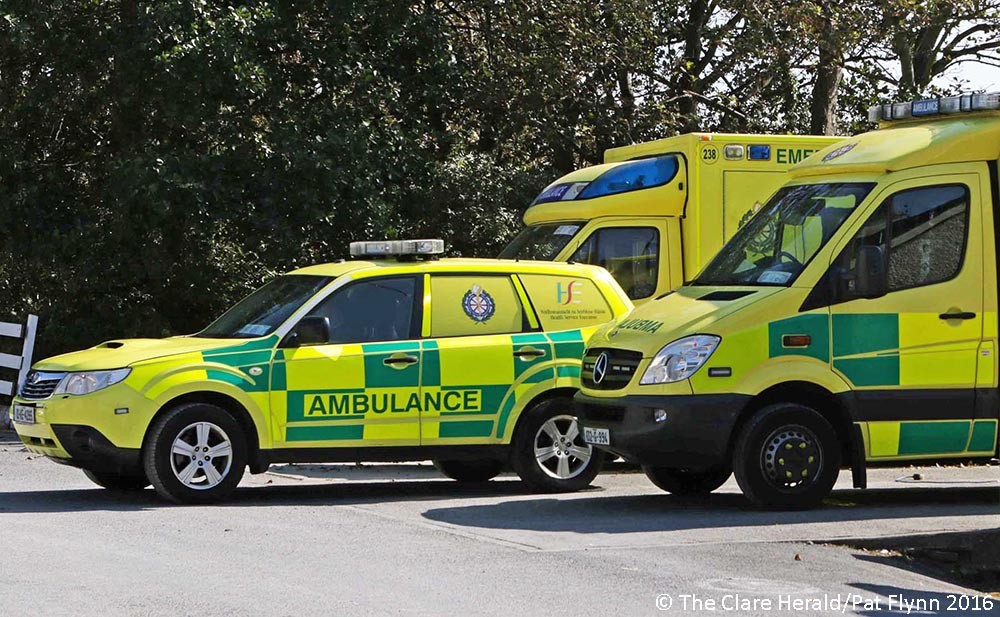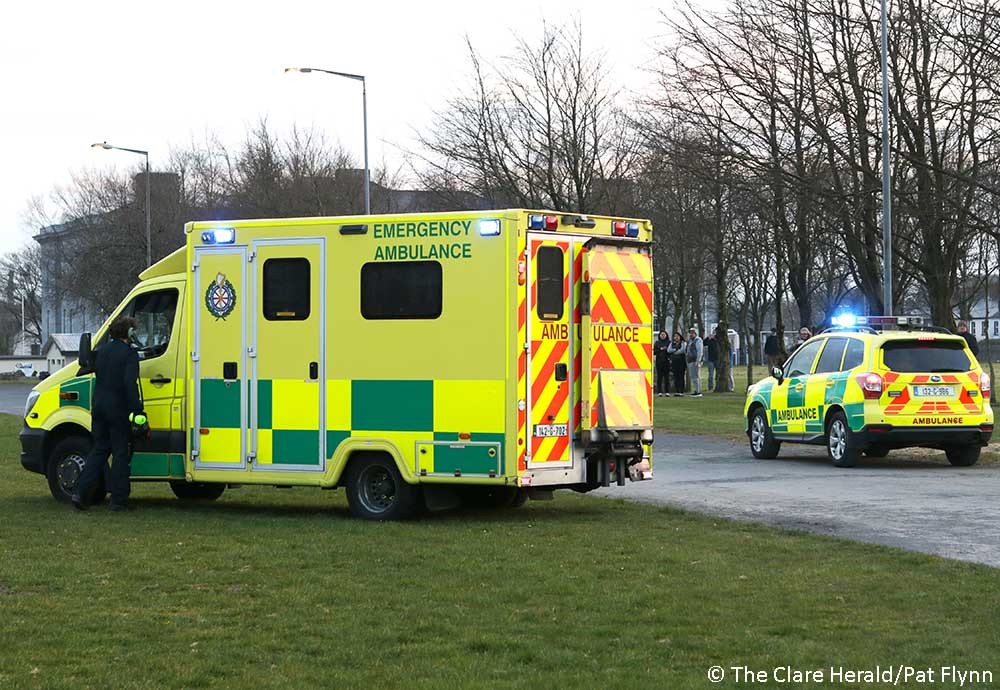The HSE’s National Ambulance Service (NAS) has blamed turn-around times at hospital emergency departments (EDs) over the Christmas and New Year period for the lack of availability of resources to respond to emergency calls.
NAS’s National Emergency Operations Centre was forced to send ambulance crews hundreds of kilometres across the country to calls because they were the nearest available resource at the time.
NAS has said however that ‘escalation policies’ are in place with EDs to manage any delays and to ensure that ambulances are available to respond to emergency calls as they arise.
The ambulance service has responded to claims that ambulance paramedics were dispatched on calls hundreds of kilometres out of their own areas over the holiday period.
Paramedics have claimed that an ambulance from Scarriff Co Clare was sent on a 900kms round-trip to calls in Tipperary and Cork while a crew from Castletownbere in West Cork was dispatched on a 500km journey to Waterford.
NAS staff also say that crews based in Limerick are regularly sent to respond to calls as far away as Dublin, Wexford and Kilkenny while ambulances from Clare have been dispatched to Laois, Tipperary, Westmeath, Cork and Kerry.

Paramedics say it’s only a matter of time before a crew is involved in an accident on an unfamiliar road or falls asleep at the wheel because they are being sent on ridiculous cross-country calls.
“This idea of dynamic deployment that the NAS continues to espouse is a myth and doesn’t work. The attitude is, let’s get an ambulance on the road to the call, any ambulance from anywhere in the country just so they can tell Hiqa (Health Information and Quality Authority) that they mobilised the nearest resource within 90 seconds,” one paramedic said.
“The crew may well be on the road in 90 seconds but it could be, and nowadays more likely to be, to a call 300 kilometres away. This regularly happens when a crew is close to the end of an already hectic 12-hour shift and they could be on the road for 4 to 8 more hours more. Someone is going to be killed and its time management stood up and stop sending us all over the country,” he added.
A NAS spokesperson said: “The National Ambulance Service (NAS) and our colleagues in hospitals, have experienced a very busy time over the recent festive season.”
“NAS dispatches resources on a national and area basis as opposed to a county basis. The National Emergency Operations Centre (NEOC) has visibility of all resources and can therefore assign the nearest available resource to every incident.
When a resource is dispatched to respond to an emergency call, which results in an area being without resources, the National Emergency Operations Centre (NEOC) dynamically deploys resources to areas where cover is required. This enables the nearest available resource to respond to emergencies,” the spokesperson said.
“Due to the high volume of calls received over the festive season, as well as the high number of attendances to hospital emergency departments, emergency ambulances experienced delays in turnaround times. The National Ambulance Service and our Emergency Department staff work together to ensure patients are transferred to hospital care as quickly and as safely as possible.

While some ambulances have experienced delays in transferring patients to ED care it is important to note that escalation policies are in place between NAS and EDs to manage any delays in patient transfers and to ensure that ambulances are available to respond to emergency calls as they arise at all times,” the spokesperson said.
SIPTU says also highlighted the issue has written to the Director of Ambulance Services and representatives of the Department of Health to request an urgent meeting to highlight our members’ “deep concerns and to seek assurances that all is being done to prevent this crisis from spilling into more communities.”
SIPTU Health Division Organiser, Paul Bell said: “SIPTU representatives are demanding that the Minister for Health, Simon Harris, the Department of Health and the Health Service Executive (HSE) take immediate and effective action to relieve the immense pressure being experienced by ambulance professionals across the country. At the end of November, SIPTU representatives requested that the HSE and Department of Health agree a protocol for the handover of patients at emergency departments.
Unfortunately, our calls were ignored and now we have an unacceptable situation where our members are reporting delays in some cases of between three and a half and seven hours outside emergency departments as our now annual winter overcrowding crisis bites. It is outrageous that in 2020 Ireland patients are being treated in the loading bays of hospitals instead of hospital beds. This is not what quality patient care looks like, and this kind of chaos is starving communities of a safe and functioning ambulance service, particularly in areas of the west of Ireland and in the midlands.”

“While the HSE and Department of Health are responding to some areas of the overcrowding crisis, primarily by attempting to boost the number of beds available in hospitals there seems to be little consideration or emergency planning to make sure ambulances are kept on the road and readily available for communities.
Over the weekend, we had the absurd situation where SIPTU members working a 12 hour shift in an ambulance base in County Clare were dispatched on a 901km roundtrip to Clonmel and back to Youghal due to local resources in being held up in Tipperary while ambulances from Kilkenny bases were dispatched to emergencies in Cork. This chaotic system is not only bad for patients and driving up ambulance waiting times it is also having detrimental effect on the health and wellbeing of our members with many ambulance professionals continuously exposed to long shift over-runs and unsatisfactory rest and break times,” Mr Bell added.
